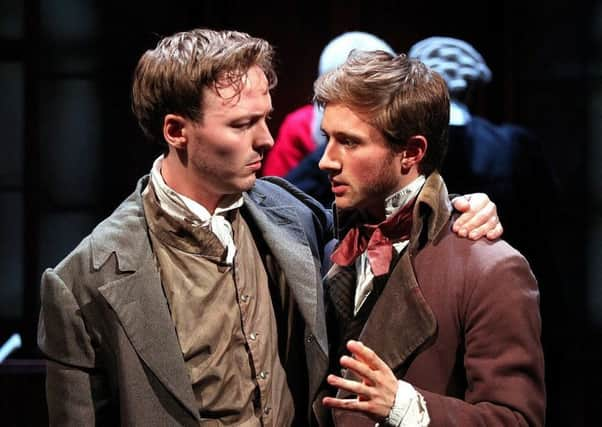Trial by Laughter - a fascinating mix of humour and social history


The writers of Trial by Laughter are Ian Hislop – editor of Private Eye, that scourge of the Establishment – and Nick Newman his lead cartoonist.
Who better, then, than this pair to research and bring to life a remarkable story of press freedom, civil disobedience and the triumph of real justice over a corrupt legal system.
Advertisement
Hide AdAdvertisement
Hide AdThe title, incidentally, is a tad uninviting – it rings of one of those tired 1970s comedy revivals, or even, for those with long memories, those priceless A P Herbert “Misleading Cases” with dotty Roy Dotrice and glowering Alastair Sim.
But this play from Hislop and Newman is fresh, original and inventive theatre: serious subject matter, delivered with irreverent humour.
In 1817 William Hone was a bookseller and minor publisher whose pamphlets, exposing corruption and injustice in the Regency establishment, brought the hammer of a corrupt Government crashing down on him. But he side-stepped that hammer and – spoiler alert – in three trials on three successive days, juries found him not guilty. And outside the courtroom 20,000 ordinary citizens gathered to cheer him.
Dora Schweitzer’s neat design switches the action briskly from court of justice to royal court to rollicking tavern, and little snatches of George Frederick Handel nicely create a sense of period.
Advertisement
Hide AdAdvertisement
Hide AdExperienced director Caroline Leslie wisely keeps a light hand on the tiller and lets the story tell itself.
The slight, inoffensive figure of Joseph Prowen, as Hone, has a vulnerability that renders the authorities’ treatment all the more outrageous. He seems initially close to underplaying, but as the courtroom tensions heighten, Prowen’s performance turns to commanding. His weapons – against the might of Royalty and Government – are wit, impertinence and popular support.
With little pre-recorded sound bursts and strategically placed company members, the audience actually becomes the jury. It’s a nice concept, but it only just worked for a slightly reserved first-night auditorium unsure whether or not to join the clamour. By the second half, though, inhibitions have disappeared and the jurors in the stalls are defying the unshaven court-official heavies.
No matter; we were intrigued and well entertained. The acting is uniformly accomplished. Some roles might very easily have slipped into the caricatures of George Cruikshank’s cartoon figures, but there is panache and evident relish among the actors. Hone’s ally, the celebrated cartoonist Cruikshank, is a zealous and fiery Peter Losasso, while Dan Mersh is a sceptical William Hazlitt.
Advertisement
Hide AdAdvertisement
Hide AdJeremy Lloyd plays the Prince Regent with ghastly vulgarity, and Helena Antoniou and Eva Scott cavort lusciously – Eva also doubling as Hone’s wife Sarah with a restrained dignity. Mersh and Nicholas Murchie are the machinating Lords of Misrule, more pantomime villains than statesmen, thwarted in three attempts to destroy Hone. And our chuckles at the riotous courtroom scenes, and Prinny’s buffoonery, are suddenly silenced by the silhouetted hanging of innocent, helpless serving-maid Eliza Fenning. The England of two centuries ago was a brutal, sinister kingdom.
Does good theatre entertain us, provoke us, surprise us, give us food for serious thought? A little of each, in Trial by Laughter, and it works splendidly.
By Kevin Anderson